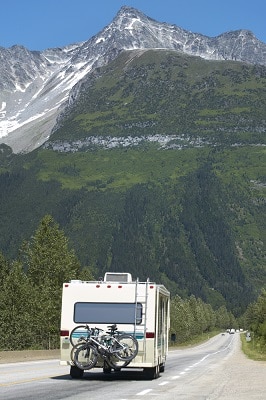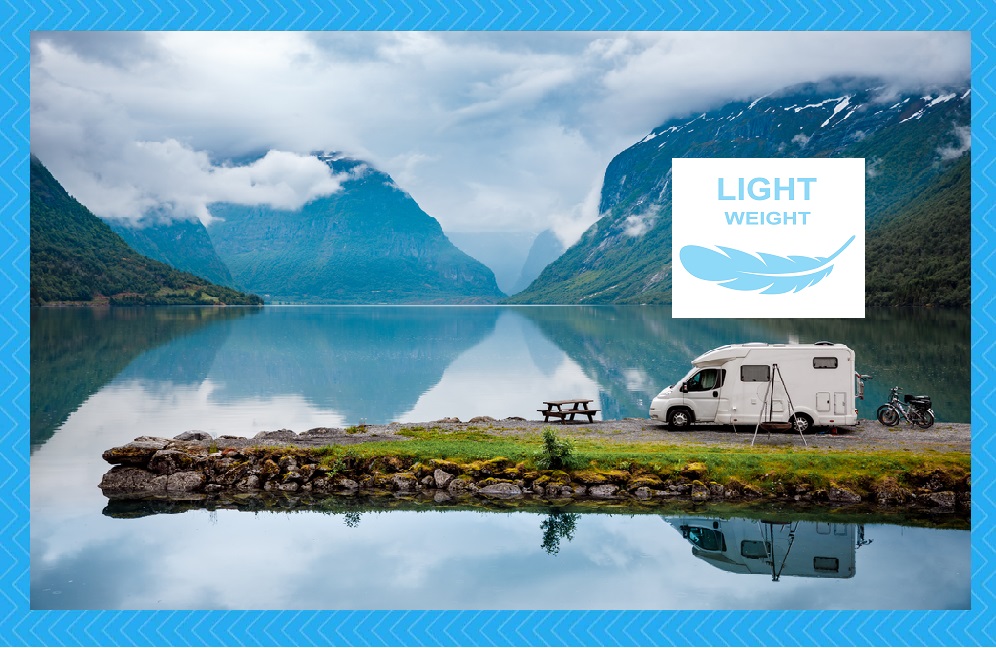
The main reason pop-ups weigh so little is that they have fewer features than other campers. For example, RV vehicles offer things that need extra space. That’s why such campers are usually long, and the length automatically increases their weight.
The Importance of Pop-Up Camper Weight
It’s true that pop-up camper weight can vary as much as the weight of any other camper. However, it is also much lower than the weight of a fifth-wheel one. The average weight of pop-ups usually depends on whether they have hard sides or not. For example, the tent-like pop-ups should weigh anywhere from 1,300 to 3,800 lbs. In contrast, the hard-sided ones weigh between 1,200 and 2,700 lbs.
If we consider the aforementioned, we can say that anyone can find a pop-up that will be just perfect both for personal needs and their vehicles. Some will look for something cozy and comfy with extra storage on the pop up’s exterior. Others will find satisfaction in sturdy campers that offer good protection with hard sides and rugged wheels.
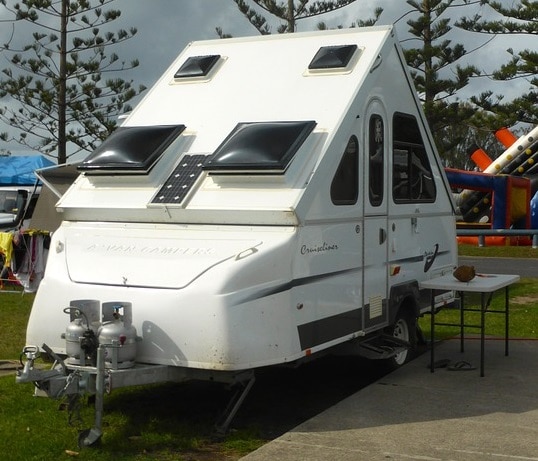
However, the features also add to the weight. So, we should always be careful that there aren’t too many of them because they can max out our towing capacity. That’s definitely not advisable. There must be some room left for other unexpected things that we might need to take with us on camping.
Pop-up camper weight is one of the main factors that decide whether we’ll be able to use a certain pop-up that we like. Still, that should not discourage us right away.
Nowadays, pop-up campers weigh much less than they used to, and there is a myriad of different options to choose from. So, even if our dream pop-up doesn’t meet the towing requirements of our vehicle, there is a good chance there is a similar one that does.
What Is the Average Pop-Up Camper Weight?
Pop-up camper weight varies a lot. It depends on multiple factors, like the features and the materials. However, most of us want to know how much a pop-up weighs on average. If we know the average weight, we can speed up the process of finding the right one for our vehicle.
Average pop-up camper weight is usually somewhere between 600 lbs and 2800 lbs. We can all agree that this average weight isn’t specific enough. Still, if we categorize pop-ups by their size and find the average weight of each category, we could narrow down the search a bit.
With that said, pop-up campers are usually classified into three different categories:
- Small
- Medium
- Large
Each category has its own average weight that directly affects the way we’ll be able to tow the pop-up with our vehicle.
For example, a large pop-up weighs more, so it will put extra pressure on our vehicle and possibly prove to be difficult to tow. On the other hand, we could easily maneuver small pop-ups due to their low weight. They will be a great choice for all those who camp not so far from home. In most cases, a sedan will be more than sufficient to pull a pop-up. However, we should consider a vehicle with a better towing capacity if we’re planning to travel a long distance.
Small Pop-Ups
The lightest pop-ups can weigh around 400 lbs. These are great for true outdoor enthusiasts who don’t need amenities and just want decent shelter during the night.
With such a pop-up, we wouldn’t have to worry at all about our towing capacity. Moreover, it will allow us to maybe take an extra passenger with us.
Traveling will also be easy because we will be able to maneuver such a trailer without any problems. However, a lot of small pop-up campers weigh just a little below 1000 lbs. For example:
- Coachmen Clipper — nearly 600 lbs
- SylvanSport GO — from 600 lbs to 800 lbs (depending on the number of features)
Medium Pop-Ups
Medium pop-up camper weight is anywhere from 1000 lbs to 2000 lbs. What’s good about these pop-ups is that we’ll still be able to tow them with a regular car.
These also offer more space than small pop-ups. Therefore, we can say that we would be better off with a medium pop-up than a small one if we want to take our family out for a picnic.
Here are some reliable pop-ups that fall into this category:
- Viking Epic Series — around 1600 lbs
- Jayco Jay Sport — from 1500 lbs to 1800 lbs (depending on the number of features)
- Coachmen Clipper — 1800 lbs
Large Pop-Ups
Large pop-ups have pop-up camper weight of 2000 lbs or more and can ever have more than 1 axle.
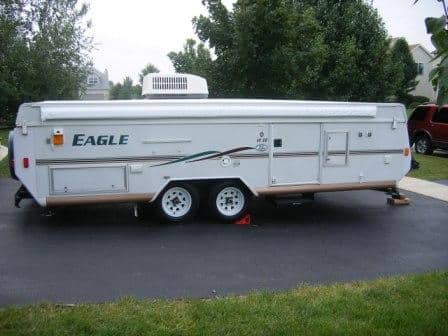
Unlike other campers, we’ll also be able to tow these with a regular car. But, our vehicle should be more powerful than the one we use for towing small or medium campers. Moreover, we should also be careful about our MPG (Miles per Gallon) because too much weight can affect it.
Still, if that sounds scary, we don’t have to go with the heaviest pop-ups out there. There are amazing models that weigh just around 2000 lbs, like the Forest River Flagstaff Classic.
Pop-Up Camper Weight Compared With Other Campers
Unlike pop-up campers, travel trailers or fifth wheels weigh a lot. Their average weight can be anywhere from 5000 lbs to 15000 lbs. That means that we’ll probably need a more powerful vehicle, like a truck, in order to tow them.
However, even though they weigh more, such campers provide more amenities and more space than pop-ups. Therefore, they are a good choice for all those who need to spend a long time traveling long distances. Moreover, they also come in numerous different versions. So, it will probably be easier to find the right travel trailer than a pop-up.
Crucial Basics About Towing a Pop-Up
If we want to buy a pop-up, we should first learn a thing or two about weight and towing. Some have probably heard of abbreviations like UVW, GAWR, or GWR. Knowing what these weight ratings mean is crucial for understanding whether our vehicle will support a certain trailer.
- GVWR — Gross Vehicle Weight Ratio is the weight of the hitch (tongue) combined with the total weight of a vehicle’s carrying capacity that includes all cargo and the passengers.
- GAWR — Gross Axle Weight Rating is the maximum axle weight combined with all cargo.
- UVW — Unloaded Vehicle Weight is the weight of a camper that includes only the weight of the axles, the hitch (tongue) and a full LP propane tank.
- CCC — Cargo Carrying Capacity is the weight left for cargo, optional features and accessories.
Vehicle Compatibility with Pop-Up Camper Weight
Vehicle compatibility with pop-up camper weight is essential for all of us who are thinking about buying a pop-up. We must always make sure that our vehicle will be able to pull a certain trailer. If it can’t, we’ll either have to find a different camper or buy a new vehicle. There are no other solutions.
Obviously, large campers like travel trailers and fifth-wheel campers will need extremely powerful cars or trucks in order to tow them. For example, a fifth-wheel camper requires a special truck that can support its hovering part.
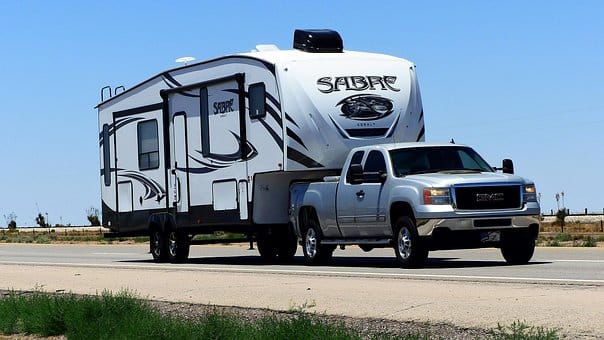
But, what about pop-ups? If we choose a pop-up camper, we’ll usually be able to tow it with the car that we already have. That’s great news because we won’t have to invest in another towing vehicle just so that we could take our family on that picnic that we’ve been dreaming about.
All in all, if a pop-up weighs less than 2000 lbs, any sedan will be able to tow it without any consequences. But if its weight goes above 2000 lbs, we should also consider some other factors alongside GVWR, GAWR, UVW, and CCC.
Weight Ratings to Consider Before Buying a Pop-Up
- Maximum trailer weight — This is the highest weight limit that a certain vehicle can tow. We should never exceed it because it is both dangerous and illegal. We can find this information inside the manufacturer’s manual of our car.
- Dry weight — Dry weight is the actual weight of the vehicle without anything on it besides the standard equipment. Unlike UVW, it doesn’t include any fluids, like fuel and a full LP propane tank. This weight is usually indicated in the pop-up’s manual.
- Tongue weight — Tongue weight represents the weight that the tongue puts on the hitch. We should differentiate it from the maximum tongue weight, which is the highest weight limit that can be put on the tongue.
- Payload capacity — Payload capacity is considered a weight rating. It represents the maximum weight that the passengers, together with the cargo, should never exceed.
This article goes in-depth of the different types of trailer hitches, classes, and towing capability of each.
Different Manufacturing Means Different Pop-Up Weight
Features affect pop-up camper weight the most. However, the materials and the construction shouldn’t be disregarded either. For example, campers that are similar in length can have a drastically different weight. Such a difference would be due to the materials used in the manufacturing process. A pop-up camper made out of aluminum would be much lighter than the one made out of steel.
Above all, the main idea behind a pop-up camper is to provide maximum comfort with reduced weight. The manufacturers achieve that through carefully designed interiors that save space. Here are some of the basic components of such a camper.
Lifter System
Traditional pop-up campers featured pulleys and springs that helped raise their roofs. Nowadays, most of them incorporate the lifter system. This system is a much better option because it is easy to use and reduces weight. It incorporates a winch controller that is connected to the pulley via a cable.
Roof
Roofs are usually not that heavy because they are mostly made out of fiberglass. However, we should always remember to take good care of them. If we don’t, they might start leaking in about five years. But don’t fret. In those cases, both replacement and repair are usually covered by the pop-up’s warranty.
Bed Platform
Bed platforms are a standard piece of equipment in all pop-ups. They are usually made out of a 2-piece aluminum frame that supports the user. In most cases, these platforms can hold up to 1000 lbs.
Floor
Floor materials are crucial for low pop-up camper weight. Manufacturers use a wide range of options that can either reduce or increase the cost of such a camper.
Carpets are both light and cheap. They are also warm and provide better insulation. Yet, it can be quite a hassle to clean them, especially if mud ends up inside the camper.
In contrast, laminate flooring can be heavy, and it also tends to increase the cost. However, it will be easy to clean and will provide a more stable surface. Vinyl is also an option. It’s light, and it can keep the water and dirt away. Yet, it is usually harder to install, so even a pop-up with a good grade vinyl might be pricey.
Slide Out
Newer pop-up campers can have a vertical slide-out that adds more inside space to the trailer by expanding out one side of the camper. Pop-up campers with slide-outs are a popular option for larger families. This will usually add the most weight out of all the above, mainly because the slide-out has its own frame and walls.
Slide-out add extra room for a dining table or bathroom usually which can make a very nice addition.
Safety Tips for Towing Pop-Ups
Before deciding to buy a pop-up, we should always check our vehicle’s capabilities. Moreover, if we own an old vehicle, it might be a good idea to take it to the mechanic first. Only a mechanic will be able to determine whether it is safe to tow a trailer with a seasoned car, especially if we haven’t done that before.
Furthermore, we shouldn’t always trust salesmen. Usually, they will try to persuade us to choose something that works both for us and them. Their intentions will probably be good, but they will not be able to foresee some towing issues of our own vehicle. That’s why we should only trust the weight ratings provided both on our car and the pop-up camper of choice.
When it comes to the weight ratings, considering only the dry weight when buying a camper won’t do us any good. We should also make sure that the overall pop-up camper weight doesn’t exceed the maximum limit.
Any weight between 2000 and 3000 lbs is more than enough to affect the balance of our vehicle. If we’re towing that much weight, steering could be extremely hard, and we would have to be very careful in order not to lose control over the vehicle. Therefore, when towing a trailer, we should always drive with our eyes wide open.
Balance is crucial when towing pop-ups. In order to achieve a perfect balance, we should consider proper weight distribution. In other words, we must distribute the weight across the trailer evenly. We should never put more cargo on one side than the other. There is also a weight-distribution hitch that can further help us achieve proper balance. It is always a good idea to buy one, especially if we’re planning to tow medium or large pop-ups.
There is also a weight-distribution hitch (picture below) that can further help us achieve proper balance. It is always a good idea to buy one, especially if we’re planning to tow medium or large pop-ups.
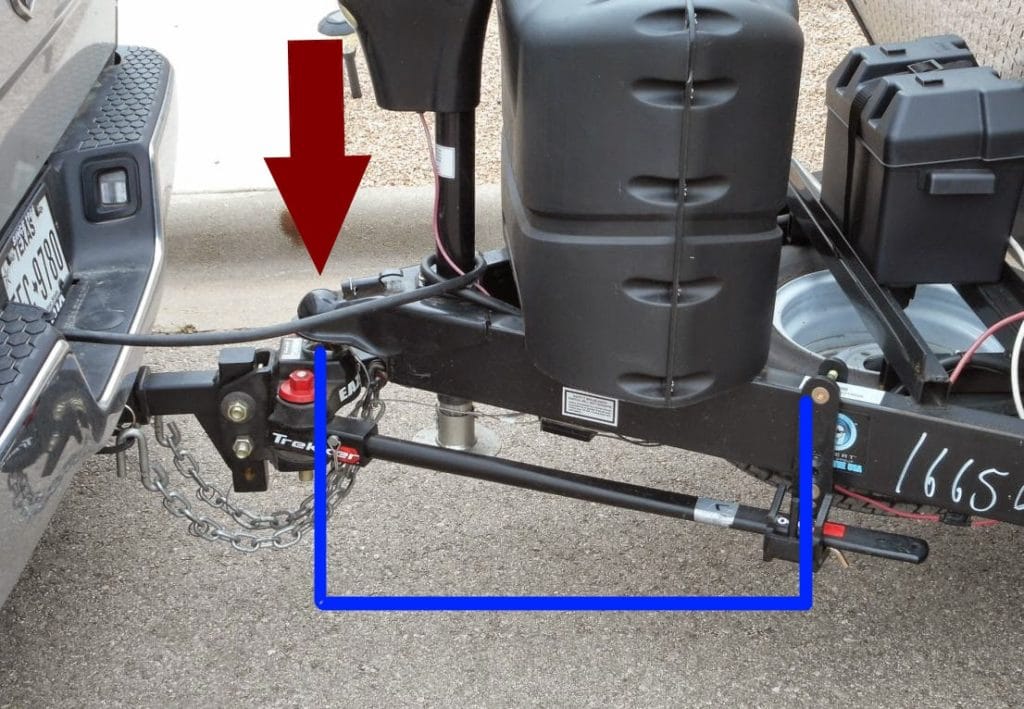
Things We Should Never Forget
Towing a pop-up can be intimidating, especially if it is our first time. However, checking the tire pressure before we start the engine will give us some peace of mind.
Double-checking whether the hitch is properly connected is a good idea too. Additionally, we should take the time to adjust the mirrors properly so that the camper doesn’t block our line of sight.
How to Calculate How Much Cargo To Load
What most car dealers won’t tell us is that the towing capacity of our vehicle is everything that we are planning to tow — plus what’s inside the vehicle itself. Therefore, we should always take this fact into consideration when we’re planning to load cargo.
So, how do we know how much cargo we can take with us and not exceed the towing limit?
For example, let’s say that our vehicle can tow up to 2400 lbs. Yet, our pop-up camper has UVW (Unloaded Vehicle Weight) of 1,200 lbs. Also, its hitch weight is 100 lbs.
In order to calculate what’s left, we must add the hitch weight to the UVW and subtract the result from 2400 lbs. In this case, we’ll be able to load another 1100 lbs on our pop-up, including the passengers.
Pop-Ups and Trailer Brakes
All campers with pop-up camper weight over 3000 lbs require trailer brakes in order to tow them safely. However, it would be a good idea to install them on all campers over 2500 lbs that provide such an option. Doing so will allow us to tow safely and without any concerns.
Those who don’t have brake controllers in their vehicles might be concerned whether they’ll be able to use trailer brakes. But they shouldn’t be.
Most RV dealers and mechanics will be able to install such controllers with ease. More importantly, such modification probably won’t break the bank. Still, we should always consult them first because the pricing may vary from one mechanic to another.
Advantages and Disadvantages of Pop-Up Campers
Advantages
Above all, pop-up campers are light, so it will be easy for us to maneuver them. Also, we won’t put too much pressure on our car, especially if we choose a pop-up from the Small or Medium category.
Pop-ups will be perfect for us if we love going on outdoor adventures. All those who don’t like to carry too much stuff with them will also cherish these. They are small, compact, and provide decent shelter when we’re out in the wild.
What’s good about these campers is that we will have more MPG than with fifth wheels or travel trailers. More MPG can reduce the cost of owning a trailer in the long run. Also, these campers won’t take up too much space in our garage. We can even fold them and thus reduce their length by half.
In contrast, some travel trailers and RVs won’t even fit through our garage doors. As a result, we’ll end up renting a bigger garage in order to store them.
Finally, pop-up campers are amazing because we can customize them to suit our own needs and preferences. With the right modifications, we can adjust them to fit only us or our family too. These modifications will cost us less than the adjustments for fifth wheels and travel trailers.
Disadvantages
On the other hand, we shouldn’t expect too much comfort from pop-up campers. There will not be much room, especially in the sleeping area. Some of them will feature a kitchenette, which is good if we’re planning to be away from home for a couple of days. Yet, these kitchenettes will cover only our basic needs.
Furthermore, what some of us don’t expect is that pop-ups usually don’t include a shower or a bathroom. If we manage to find some that do, they will most certainly be expensive. In other words, we’d probably be able to buy a small travel trailer for that money. What’s more, such pop-ups will be much heavier, and we’ll need a rather powerful vehicle in order to tow them.
Another thing that we must consider is that pop-ups don’t have air conditioning or heaters. Therefore, if we really need to use one when it’s hot or cold outside, we should invest in a portable heater or air conditioner.
Generally speaking, pop-ups are not a perfect choice for storms and bad weather conditions either. We can’t really rely on them for long-term survival. However, they will provide decent shelter against rain.
Investing in a pop-up camper means that we’ll need to compromise too. Such campers are for specific needs only. They are great for small family picnics, or if we’re into hardcore adventuring with only the bare necessities. In contrast, if we want a lot of space and actually be able to live in a trailer for some time, we should consider buying an RV.
The Pros and Cons of Pop-Up Campers
Pros
- Lightweight
- Easy to maneuver and tow
- More MPG than travel trailers
- Provide decent shelter
- Versatile
- Less expensive than other campers
Cons
- Provide less space than travel trailers
- No toilets or bathrooms
- No air conditioning
Why Pop-Ups are Great for Boondocking
So, what is boondocking? Not all of us are familiar with the term, especially if we’ve never had a camper before.
Boondocking is actually camping without electricity, running water, or other available amenities, like toilets and showers.
Some people also call it dry camping, off-grid camping, dispersed camping, or off-the-cord camping. However, boondocking is probably the most popular term in the RV community. In contrast, government agencies prefer to use dispersed camping.
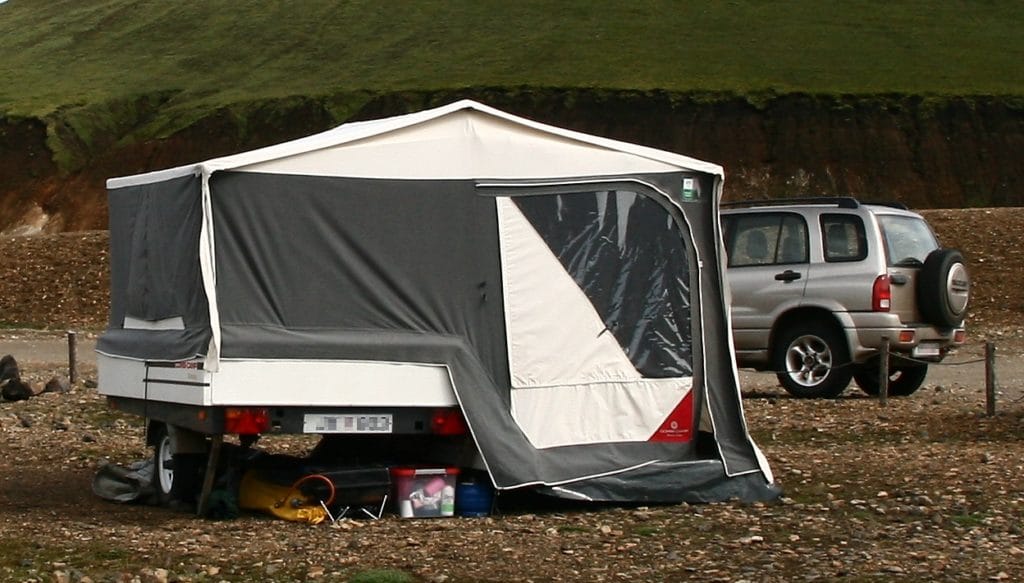
When we go boondocking, we go to reconnect with nature. We leave all distractions of modern-day society behind and just enjoy spending our time in the wild and having fun.
Why Should Boondockers Choose Pop-Up Campers
Pop-ups are great for boondocking even though they don’t offer amenities like a bathroom. Still, some may argue that tents also don’t have bathrooms but are significantly cheaper than pop-ups.
That statement could very well be true, but does that mean that tents are a better option for camping off-grid?
Unlike simple tents, pop-up campers allow us to have freshwater tanks that can hold up to 25 gallons of water. Some pop-ups also have grey water tanks that support up to 11 gallons of water, and the expensive ones even have toilets with black water tanks.
Even though boondocking is all about experiencing nature, having freshwater and a more secure shelter will definitely make our boondocking experience more enjoyable.
One thing we should keep in mind, though, is that water is heavy. One gallon of water equals eight pounds. Therefore, we should always take the water into consideration when we are calculating the weight of our cargo.
Still, whenever we’re out camping, we must remain environmentally conscious and conscientious. If we need to dump gray water, we ought to first make sure that we’re using biodegradable products. And in order to avoid contamination, we should never dump it near lakes, rivers, or other water sources.
Above all, we should never dump black water in the wilderness. If we need to empty the containers, we can do that before our trip or when we find a proper RV dump station.
If your worried about being without power check out our solar guide for some great tips on setting up solar kits to get power when you are in the middle of the forest or desert.
In Conclusion
Camping outdoors is probably the best way to reconnect with nature and relieve the stress caused by our daily lives. Pop-up campers are great for that because they are lightweight, as well as easy to tow and store in garages. They provide only the amenities we need, and that’s why they weigh so little.
Above all, with such campers, there’s no room for any modern-life distractions when we’re out in the wilderness. They allow us to enjoy ourselves in peace. What’s more, when compared to travel trailers, these pop-ups are both less expensive and easier to maintain. They are the perfect solution for all of us who like to keep things simple.

